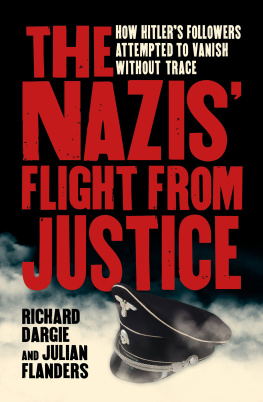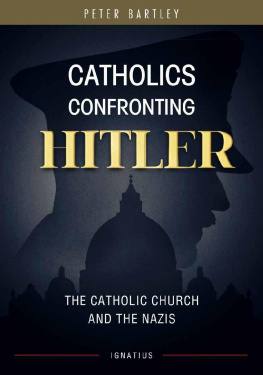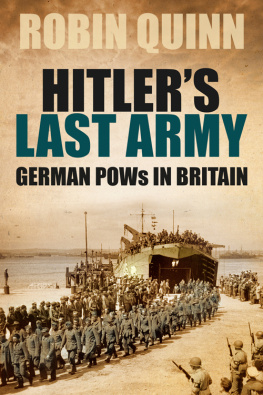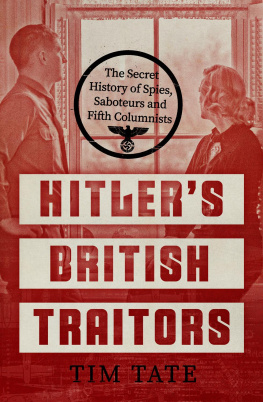Hitlers Traitors:
German Resistance to the Nazis
Susan Ottaway
First published by Leo Cooper Ltd. in 2003
Published by Thistle Publishing in 2014
Copyright Susan Ottaway 2003, 2014, 2020
This edition published in 2020 by Lume Books
30 Great Guildford Street,
Borough, SE1 0HS
The right of Susan Ottaway to be identified as the author of this work has been asserted by them in accordance with the Copyright, Design and Patents Act, 1988.
All rights reserved. No part of this publication may be reproduced, stored in a retrieval system, or transmitted in photocopying, recording or otherwise, without the prior permission of the copyright owner.
Table of Contents
Introduction
This is not a scholarly work nor was it ever meant to be so. It is not a definitive history of the German opposition to Hitler and the Nazi party either that would take too many volumes. I have simply tried to present the stories of how Hitler came to power and some of the brave individuals and groups who risked their lives in an effort to free themselves and their country from tyranny.
Contrary to popular belief there were a significant number of German citizens who abhorred the principles of the Nazi party and who did their utmost to rid Germany of its evil regime. The task that they set themselves was not an easy one. Not only were they fighting the party, the government and all its servants, they could not know which of their neighbours, casual acquaintances and even friends and family would turn against them and betray them. In Nazi Germany tale-telling was encouraged. It was ones civic duty to inform on anyone who did not swallow the party line and all its obscenities. Anyone who made even the most casual remark against the party ran the risk of being overheard and betrayed. Arrest, imprisonment and even death often followed.
It was useless to appeal to reason there was no reason in Nazi Germany, at least none that a civilized society could accept. This, of course, begs the question, how could it have happened? Germany was, after all, a civilized, cultured society. But Hitler and his uniformed thugs played upon the tendency of the population to be law abiding and then backed this up with threats and reprisals to anyone who was out of line. There were many German people who thoroughly disliked the Nazi regime but who, fearful for their lives and those of their families, acknowledged that it was the government of their country.
It is perhaps easy for us, in the 21st century, to criticize and we would all like to imagine that we would be different. It is a disappointing fact that people are usually much more courageous in theory than in practice. It is hard to go against the general trends; to stand out from others for our beliefs: much easier to follow everyone else and toe the line. How many of us would have acted against the Nazis had we known that our husbands or wives, or our children would be made to suffer for our actions; that they would be arrested, imprisoned and probably executed simply because they belonged to the family of a dissenter? No one was exempt. Even young unmarried men and women knew that their parents, brothers and sisters would be made to suffer if they were discovered. It takes a very brave person with unshakeable ideals to stand up for their principles knowing all that might result.
Chapter One
The Birth of a Dictator
Adolf Hitler was born on 20 April 1889 in the Austrian border town of Braunau am Inn where his 52 year-old father, Alois, was a customs officer.
Aloiss parents, Johann Georg Hiedler and Maria Anna Schicklgruber, were not married when their son was born in 1837 and he was given his mothers surname. Five years after his birth, his parents did marry but never lived together and Alois was mainly brought up by an uncle.
When he was 10 years old his mother died and his father left home, not telling anyone where he was going. He didnt return until his son was nearly 40. By then he had changed the spelling of his name to Hitler and eventually, and rather belatedly, acknowledged Alois as his son, enabling him to change his name from Schicklgruber to Hitler.
Alois had trained as a shoemaker but soon tired of it and at the age of 18 joined the border police, which was part of the customs service, and went to work near Salzburg. When he eventually became a customs officer himself at the age of 27, he married the daughter of another customs official. His marriage to Anna Glasl-Hoerer, who was 14 years his senior, was not happy although they remained together for 16 years, before separating three years before Annas death. Alois was not a faithful husband and even before his separation from Anna he had been having an affair with a young woman called Franziska Matzelsberger who was a cook in a hotel. She gave him his first child, a boy also named Alois, in 1882. One month after the death of his wife in 1883, Alois married his mistress who was, by then, pregnant again. She gave birth to their daughter, Angela, three months after their wedding. This marriage did not last either, Alois becoming a widower for the second time a year later when Franziska succumbed to tuberculosis.
Alois was not particularly upset at losing his wife; she too, had separated from him before her death. Six months later he married his second cousin, Klara Plzel. The third Mrs Hitler was 23 years younger than her husband and had, at one time, lived with Alois and his first wife before going to Vienna to work as a maid. She returned when Aloiss second wife left him and he was in need of a housekeeper. By the time they married Klara was pregnant. She gave birth to a boy they named Gustav, in 1885 four months after the wedding. Sadly the child died soon after birth as did his sister, Ida, who was born the following year. Their third child was a boy. They named him Adolf. Another boy, Edmund, who lived to be just six years old, followed him in 1894 and, in 1896, their fifth and last child, a girl named Paula, was born. She, like her brother, Adolf, lived to adulthood.
Adolf Hitler began his schooling in 1895 at the village school of Fischlham. He enjoyed school and did well at his lessons but because his father found it hard to settle in one place, he was sent to many different schools before the family finally settled in Linz. At one point in his education he was taught by monks in a monastery where he developed a desire to become a priest. This ambition did not last long and by the time he was due to begin his secondary education he had decided to become an artist. He went to the secondary school in Linz where his father was happy for him to study art until he realized that his son intended to make it his career. Alois Hitler was determined that his son should follow him into the civil service. As Adolf later disclosed in his book, Mein Kampf :
It was simply inconceivable to him that I might reject what had become the content of his whole life. Consequently, my fathers decision was simple, definite, and clear; in his own eyes I mean, of course. Finally, a whole lifetime spent in the bitter struggle for existence had given him a domineering nature, and it would have seemed intolerable to him to leave the final decision in such matters to an inexperienced boy, having as yet no sense of responsibility. Moreover, this would have seemed a sinful and reprehensible weakness in the exercise of his proper parental authority and responsibility for the future life of his child, and as such, absolutely incompatible with his concept of duty.
Young Adolf was just as determined as his father and at the age of 11 decided that rather than try to reason with him he would try other methods to get his own way. Although he had started his schooling as a promising student he decided to stop working in all the subjects that did not interest him. He felt that once his father saw that he was not doing well enough to join the civil service, he would let him do what he wanted.










